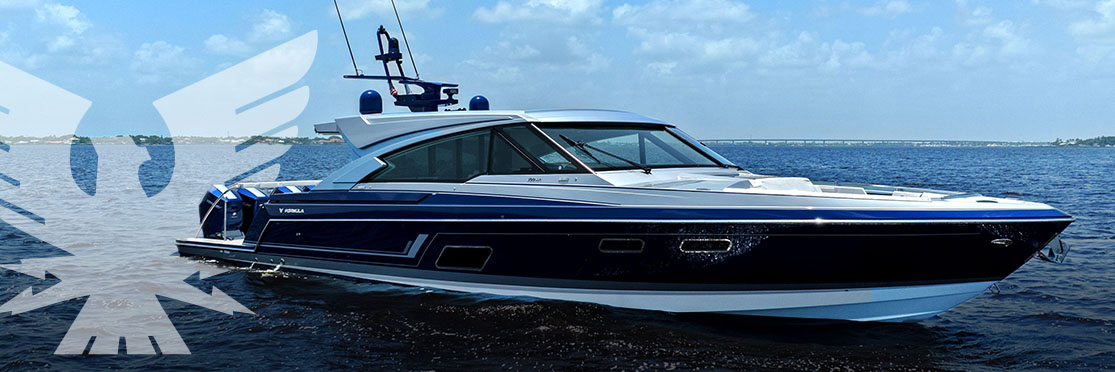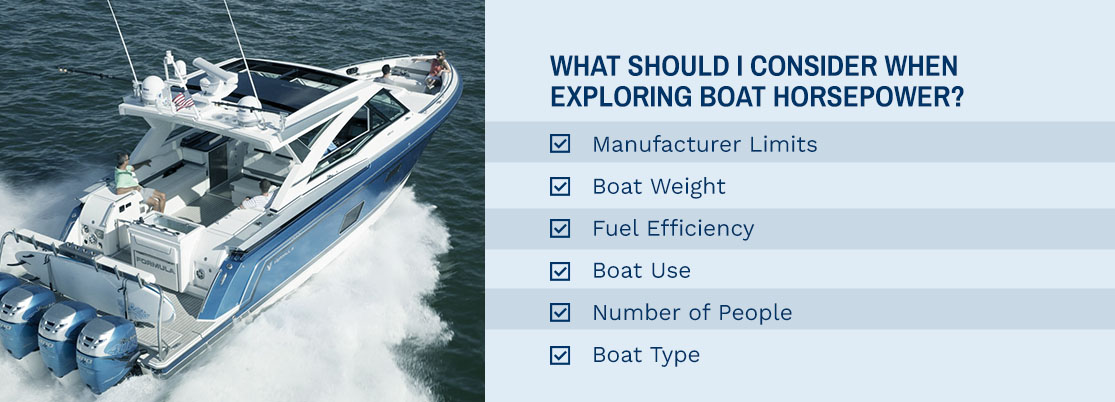
Whether you’re buying a new boat or repowering your current one, deciding the right amount of horsepower (hp) you need is one of the biggest decisions you’ll have to make. Getting it right is a balance that results in reliable performance, efficiency and safety because every hull has a specific power range.
Exceeding your boat’s power needs or falling short can lead to unfavorable consequences on the water. So, how much horsepower do you need for your boat? This guide breaks down the ideal boat horsepower based on key factors such as boat size, weight and purpose.
What Is Boat Horsepower?
Horsepower is defined as a unit of power equivalent to 550 foot-pounds per second. It’s generally used to measure the power of boat and auto engines, but its original use was to describe the power of the steam engine invented by James Watt, a Scottish engineer during the late 1700s. The engine was an upgrade of an earlier design by Thomas Newcomen, and it offered similar performance at a much lower fuel consumption.
James Watt developed the engine power measurement (horsepower) by comparing the work of horses to that of his invention, defining one horsepower as 33,000 foot-pounds of work per minute, or 550 foot-pounds per second.
How Much Horsepower Do I Need for My Boat?
There are various factors to consider when determining how much horsepower you need for your boat. However, you can estimate your boat’s ideal hp in a few ways. For longer boats over 20 feet that don’t have a plate listing horsepower details, use the weight-to-horsepower ratio. Basically, 25 to 40 pounds of the total boat weight per horsepower.
For example, divide the weight of your fully loaded boat by 25 or 40 to get an ideal horsepower range. For instance, a 2000-pound boat will have the following horsepower range:
- 2000 ÷ 25 = 80
- 2000 ÷ 40 = 50
For boats under 20 feet in length, the U.S. Coast Guard capacity plate is a good indicator of the boat’s load-carrying capacity. If the plate is missing, estimate the maximum horsepower with this formula:
- (2 x Length x Transom Width) – 90 = Maximum hp
For example, an 18-foot boat with an 8-foot beam will be:
- (2 x 18 + 8) – 90 = 198 hp
What Should I Consider When Exploring Boat Horsepower?

There are various factors that impact a boat’s maximum HP:
1. Manufacturer Limits
The easiest place to start is with the boat’s capacity plate — or owner’s manual. In addition to giving you a maximum for passengers and cargo, the manufacturer will also spell out the absolute maximum boat horsepower.
If you have a boat that was built before 1972, came from overseas or was home-built, you may not have a capacity plate, but boat owners’ manuals are often available online. If not, you can always contact the boat’s manufacturer to inquire about your specific boat model’s limits and recommendations.
2. Boat Weight
The most important factor in figuring out your boat’s horsepower is weight. Determine the horsepower needed for your boat by checking whether the weight of your unloaded boat falls under the lightweight or heavyweight category.
3. Fuel Efficiency
Modern boat engines are designed to offer improved fuel efficiency over their older counterparts. Whether buying or replacing an engine, opting for newer models with the right horsepower can provide better fuel efficiency without sacrificing performance.
4. Boat Use
As with most decisions related to boating, the use of the boat is always a factor. Are you using the boat just to cruise with friends and family? Or will you be pulling water skiers and wakeboarders? The addition of pulling someone behind the boat — and the additional weight of storing watersport accessories — increases the need for power and is often a reason to consider additional horsepower.
5. Number of People
The more passengers and load you plan to carry, the more horsepower you need to ensure smooth handling and acceleration. If your boat tends to operate near full capacity, an engine that is closer to the manufacturer’s recommended limit would be ideal.
6. Boat Type
The type of boat you choose plays a significant role in determining horsepower needs. For example, watersports require higher horsepower to maintain high speeds and accommodate towing. For pontoons and fishing boats, midrange power is ideal for moderate speeds and smooth rides.
Is It Illegal to Overpower a Boat?
According to the federal government, yes. There are a few different ways you can define overpowering a boat. The horsepower capacity section of the Code of Federal Regulations contains the official definition. These federal laws are in place to ensure the appropriate horsepower limits are listed on all boats.
State and local laws regarding overpowering your boat vary. Ensure you know the state and local laws for the areas in which you’ll be boating. Otherwise, your excess horsepower may put you at risk of fines and other legal consequences.
Does Horsepower Have an Impact on Boat Insurance?
The amount of horsepower your boat has will influence your boat insurance. Here are three main areas of insurance that the amount of horsepower you choose will affect:
- Overall coverage: There is a chance your insurance company will not cover a vessel that exceeds the boat manufacturer’s maximum horsepower. This is an important factor, as it could affect your ability to get insurance coverage for your boat. If your boat is currently insured and you’re considering a motor upgrade, make sure you know your insurance company’s rules for horsepower limits.
- Premium cost: While abiding by your insurance company’s rules for boat horsepower, it’s important to remember that doesn’t mean a change in horsepower won’t bring a change in your premium cost. As a rule of thumb, boats with higher horsepower will be more expensive to cover.
- Type of policy: The overall size of the vessel, which takes horsepower into account, may determine the type of boat insurance policy you need to get. For example, your homeowner’s or renter’s insurance policy will usually cover smaller powerboats with less than 25 horsepower. Boats that are larger and have more than 25 horsepower almost always require a separate boat insurance policy.
Is It Risky to Overpower Your Boat?
Putting more horsepower behind your boat may seem like an innocent way to add some excitement to your boating experience, but it could cost you a significant amount of money in fines, lawsuits and damage to your boat. Here are a few examples of how your need for speed can get you in trouble when it comes to maximum horsepower:
- Accident lawsuits: Even if your state and local laws don’t address overpowering a boat, you’re still putting yourself at risk in other ways. The fact that your boat’s horsepower is above the manufacturer’s recommendations puts you at risk of negligence, which can result in a lawsuit, especially in a case where there are damages.
- Boat damage: The additional speed applies pressure that can cause significant damage to your boat. Every part of your boat, from the transom to the bow, is designed to withstand a certain amount of pressure and stress. Overpowering the boat exposes various components to stress, risking significant damage to the hull of your boat.
Finding a Boat With the Ideal Balance
At Formula Boats, we know the balance of giving you the power and speed you want while making sure safety is a priority. If you’re considering purchasing a boat, our online boat builder gives you the opportunity to fully customize several different boat models with a few different horsepower options. You can be sure horsepower options for each boat model we provide are within the limits we believe maximize your performance while maintaining safety.
We have dealers located throughout the country ready to help you find your perfect boat. Interested in one of our boat models, but are still unsure how much horsepower you need? Contact our team for more information.

